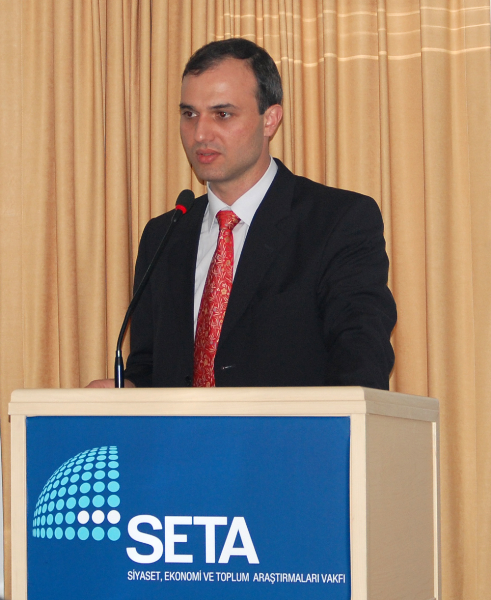SETA PUBLIC LECTURE Ahmet Kuru Assistant Professor of Political Science, San Diego State University Date: June 3, 2010 Thursday Time: 16.00 – 18.00 Venue: SETA, Ankara
Why do secular states pursue different policies toward religion? Kuru’s book provides a generalizable argument about the impact of ideological struggles on the public policy making process, as well as a state-religion regimes index of 197 countries. More specifically, he analyzes why American state policies are largely tolerant of religion, whereas French and Turkish policies generally prohibit its public visibility, as seen in their bans on Muslim headscarves. In the United States, the dominant ideology is “passive secularism,” which requires the state to play a passive role, by allowing public visibility of religion. Dominant ideology in France and Turkey is “assertive secularism,” which demands that the state play an assertive role in excluding religion from the public sphere. Passive and assertive secularism became dominant in these cases through certain historical processes, particularly the presence or absence of an ancien régime based on the marriage between monarchy and hegemonic religion during state-building periods. Ahmet T. Kuru discussed these timely questions at SETA.
***
Ahmet T. Kuru is Assistant Professor of Political Science at San Diego State University. He was the Postdoctoral Scholar and Assistant Director of the Center for the Study of Democracy, Toleration, and Religion at Columbia University. Kuru received his PhD from the University of Washington, Seattle. He is the author of Secularism and State Policies toward Religion: The United States, France, and Turkey (Cambridge University Press, 2009). This book is based on his dissertation that was given the Wildavsky Best Dissertation Award by Religion and Politics Section of the American Political Science Association. His publications also include "Secularism, State Policies, and Muslims in Europe: Analyzing French Exceptionalism," Comparative Politics 2008; "Passive and Assertive Secularism: Historical Conditions, Ideological Struggles, and State Policies towards Religion," World Politics, 2007; "Globalization and Diversification of Islamic Movements: Three Turkish Cases," Political Science Quarterly, 2005.
***
SETA olarak 03.06.2010 tarihinde düzenlemiş olduğumuz “Secularism and State Policies toward Religion: The United States, France, and Turkey” başlıklı panele Talip Küçükcan (SETA) oturum başkanlığı yapmış, San Diego Devlet Üniversitesi’nden Ahmet T. Kuru konuşmacı olarak katılmıştır.
Öncelikle sekülerizmden ne anlaşılması gerektiği üzerinde duran Kuru, belirli kriterlerin ışığı altında Türkiye, ABD ve Fransa’daki seküler yapıları karşılaştırmalı olarak tahlil etmiştir. Bu çerçevede ABD’de pasif sekülerizm (passive secularism) mevcut iken Türkiye ve Fransa’da kendini daha çok hissettiren ve aktif bir seküler yapının (assertive secularism) olduğunu anlattı. Ahmet Kuru, ABD’de dini sembollerin kamuoyunda daha görünür olmasına rağmen Fransa’da bu konuda daha fazla tartışma olduğu, ancak en çok Türkiye’de kamusal alanda dini sembollerin görünürlüğünün düşük olduğunu vurguladı. Bu ülkelerin arasındaki farkların temelde ideolojilerinden kaynaklandığını ve bu ideolojik yapılarının da temelde eski rejim (ancien regime) ile olan ilişkine göre şekillendiğini anlatan Kuru, Türkiye’de son dönemde kısmen de olsa katı seküler yapının daha ılımlı bir hale gelmeye başladığına işaret etti. Kuru’ya göre buradaki en önemli ilişkin demokratikleşme ile seküler yapının daha ılımlı bir hal alması arasındaki ilişkidir ve Türkiye bu bakımdan son dönemde birtakım olumlu adıml








